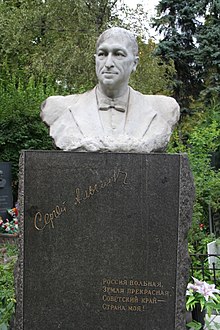Sergei Yakovlevich Alymov

Sergei Jakowlewitsch Alymow ( Russian Сергей Яковлевич Алымов ; * March 24th July / April 5, 1892 greg. In the village of Slavgorod, Kharkov Governorate ; † April 29, 1948 in Moscow ) was a Ukrainian- Soviet writer and poet .
Life
Alymov attended business school in Kharkov , which he did not graduate. In the summer of 1911 he was exiled to Siberia in the Yeniseisk governorate for his participation in revolutionary activities , but soon fled from there to China . He toured Japan , Korea and Australia and returned to China in 1917, where he settled in Harbin . In 1920 he published his first volume of poems there, which was strongly influenced by Futurism . At the same time he was (together with Dawid Burljuk , Nikolai Assejew , Sergei Tretyakov and others) a member of the futuristic artist group founded in Vladivostok around the magazine "Twortschestwo" ( Творчество ).
In 1926 he returned to the Soviet Union . In Moscow , he wrote popular poems and song lyrics as Вася-Василёк (1940; music by Anatoly Novikov ) Хороши весной в саду цветочки (music by Boris Mokroussow ) and Под луной золотой (music by Isaac Dunajewski ), and even the authorship of the partisan anthem По долинам и по взгорьям was attributed to him.
One of his best-known works in the West is his novel Shanghai , a literary reflection on city life from the 1920s.
Because of his good knowledge of English, he was often used in Moscow as an interpreter for American writers visiting the USSR. In the 1930s, however, his alcoholism put an end to this activity. During World War II , Alymov took part in the defense of Sevastopol . He died in a car accident in 1948.
Works
- Киоск нежности: Стихи ( The Pavilion of Tenderness: Poems ) Окно, Harbin 1920
- Оклик мира . Harbin 1921.
-
Нанкин-род . Proletarij, Kharkiv 1929
- German edition: Shanghai. Translated from the Russian. by Boris Krotkow and Hedwig Stern. Gutenberg Book Guild , Berlin 1932
- Песни . Сов. писатель, Moscow 1939
- Все для победы! Стихи и песни . Сов. писатель, Moscow (Kazan) 1942
- Этих дней не смолкнет слава . Военмориздат, Moscow and Leningrad 1946
- Песни . Музгиз, Moscow and Leningrad 1948
- Стихи и песни . Сов. писатель, Moscow 1949
- Избранное . Воениздат, Moscow 1953
Individual evidence
- ↑ Archived copy ( Memento of February 29, 2008 in the Internet Archive )
- ↑ Not entirely without controversy, however; some sources give as the author of this song, which was also very popular in the later GDR under the title Partisanen vom Amur (in the German version by Ernst Busch and KuBa : Durchs Gebirge durch die Steppen / our bold division ), either Pjotr Parfjonow or Sergei Parfionov . The song itself apparently dates back to 1919, cf. Archived copy ( Memento of September 28, 2007 in the Internet Archive )
- ↑ In 1962 the Supreme Court of the RSFSR ruled that the author's rights to the world-famous hymn belong to Pyotr Parfjonow alone, cf. http://www.vekperevoda.com/1887/alymov.htm
- ↑ http://www.vekperevoda.com/1887/alymov.htm
Web links
- Literature by and about Sergei Jakowlewitsch Alymow in the catalog of the German National Library
- Сергей Алымов
Name variants
Sergei Alymow, Sergej Alymov, Sergej Âkovlevič Alymov, Sergěj Jakovl. Alymov, Sergei Iakovlevich Alymov
| personal data | |
|---|---|
| SURNAME | Alymow, Sergei Jakowlewitsch |
| ALTERNATIVE NAMES | Алымов, Сергей Яковлевич (Russian) |
| BRIEF DESCRIPTION | Soviet writer and poet |
| DATE OF BIRTH | April 5, 1892 |
| PLACE OF BIRTH | Slavgorod |
| DATE OF DEATH | April 29, 1948 |
| Place of death | Moscow |